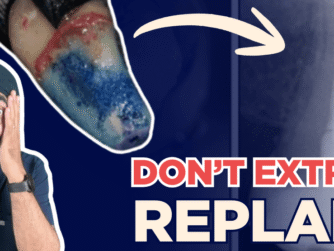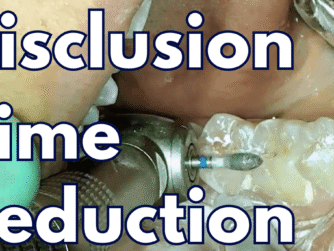Podcast: Play in new window | Download (Duration: 41:09 — 59.7MB)
Subscribe: RSS
Are ergonomic loupes and fancy chairs really worth the investment?
Is back pain an inevitable part of being a dentist—or can it be prevented?
Are you setting yourself up for a long, pain-free career in dentistry?
What’s the number one thing you should be doing right now to protect your body for the long haul?
Dr. Sam Cope is back, and he’s not just any dentist—he started as a physiotherapist before training in dentistry. That means when it comes to musculoskeletal health, posture, and career longevity, Sam knows his stuff. In this episode, Jaz and Sam revisit the crucial topic of back pain in dentistry and dive even deeper into what actually works to keep you practicing pain-free.
So, if you clicked on this because you’re worried about back pain, take this as your sign—your future self will thank you.
Protrusive Dental Pearl: Motion is lotion. Staying active prevents back pain and keeps your career strong. If you’re not making time for exercise, it’s time to rethink your habits. Knowing isn’t enough—action is what matters. Prioritize your health now.
Key Take-Away:
- Posture and back pain have no direct correlation.
- Apprenticeships provide invaluable experience and learning opportunities.
- Investing time in learning and shadowing can accelerate career growth.
- Ergonomic tools can enhance comfort but should be tailored to individual needs.
- Mental health is crucial for dentists, and seeking help is a sign of strength.
- The human body can adapt to various postures with training.
- Choosing a specialization should align with personal interests and strengths.
- Preventative measures in ergonomics can improve career longevity.
- Continuous learning and adaptation are essential in the dental field. Choosing the right dental chair is crucial for comfort.
- Preventative strategies for back pain include regular exercise.
Need to Read it? Check out the Full Episode Transcript below!
Highlights of this episode:
- 02:05 Protrusive Dental Pearl
- 04:26 Sam’s Journey from Physio to Dentist
- 10:33 The Value of Apprenticeships and Mentorship
- 16:24 Niching in Dentistry
- 22:30 Ergonomics in Dentistry: Loupes and Chairs
- 27:03 Choosing the Right Chair for Your Comfort
- 29:54 Top Tips for Dentists to Prevent Back Pain
This episode is eligible for 1 CE credit via the quiz below.
This episode meets GDC Outcomes A and C.
AGD Subject Code: 130 ELECTIVES (149 Multi-disciplinary topics)
Aim:
To highlight the importance of ergonomics and physical well-being in dentistry. To share strategies for preventing occupational strain and burnout.
Dentists will be able to –
1. Assess the role of ergonomic loupes, chairs, and posture in reducing strain and improving long-term musculoskeletal health.
2. Understand the significance of muscle conditioning over posture correction.
3. Incorporate exercise routines to manage physical strain during long procedures.
If you enjoyed this episode, you won’t want to miss Got Your Back – Physios and Dentists – PDP025!
#PDPMainEpisodes #BeyondDentistry #CareerDevelopment







